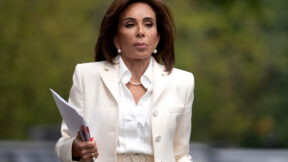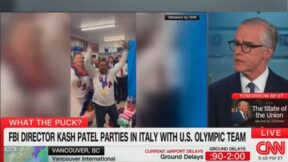U.S. Ambassador Says Country Is Working on ‘A Final Solution’ After Vetoing Gaza Ceasefire Resolution
U.N. Ambassador Linda Thomas-Greenfield defended the U.S. veto of a ceasefire resolution at the Security Council on Tuesday while pledging to forge “a final solution” to the ongoing conflict between Israel and Gaza. The ambassador was speaking of the need for hard diplomacy to secure the release of the remaining 100 Israeli hostages and deliver humanitarian assistance.
It was an unfortunate misspeak.
Israel appears poised to invade the Gazan city of Rafah, which borders Egypt. More than one million Palestinians have fled there to escape Israel’s invasion and bombing of the territory since the Oct. 7 attacks by Hamas, which killed 1,200 Israelis. In response, Israel’s military campaign to destroy the group has killed more than 28,000 Palestinians and displaced 85% of the population. Residents of Gaza are facing a humanitarian disaster. At least one U.S. senator has accused Israel of war crimes.
Israeli Prime Minister Benjamin Netanyahu has resisted international calls urging him not to invade Rafah.
“Whoever tells us not to operate in Rafah, is telling us to lose the war,” he said. Opponents of an invasion have noted that people in Rafah do not appear to have anywhere to escape.
Advanced by Algeria, the Security Council resolution would have ordered an immediate ceasefire in the conflict. Moreover, it would have rejected the displacement of Palestinians and called on all parties to comply with international law.
After the vote, Thomas-Greenfield defended the veto, which was the lone vote against the measure. The final tally was 13 in favor with one opposed and one abstention. She also touted a resolution submitted by the U.S. calling for a temporary ceasefire with the condition that Hamas release the hostages first.
She said:
We’re eager to continue working with the Council on this proposal – one that would see a temporary ceasefire as soon as practicable based on the formula of all hostages being released and one that would get aid into the hands of those Palestinians who so desperately need it. All told, we intend to do this the right way so that we can create the right conditions for a safer, more peaceful future. And we will continue to actively engage in the hard work of direct diplomacy on the ground until we reach a final solution
The resolution vetoed by the U.S. was widely described in Western media as “Arab-backed,” presumably because it was proposed by Algeria. However, most of the Council members that voted for the measure are not Arab-majority countries.
The thirteen voting in favor were China, France, Russia, Algeria, Ecuador, Guyana, Japan, Malta, Mozambique, Sierra Leone, Slovenia, South Korea, and Switzerland. The U.K. abstained.
Watch above via Al Jazeera English.
New: The Mediaite One-Sheet "Newsletter of Newsletters"
Your daily summary and analysis of what the many, many media newsletters are saying and reporting. Subscribe now!






Comments
↓ Scroll down for comments ↓